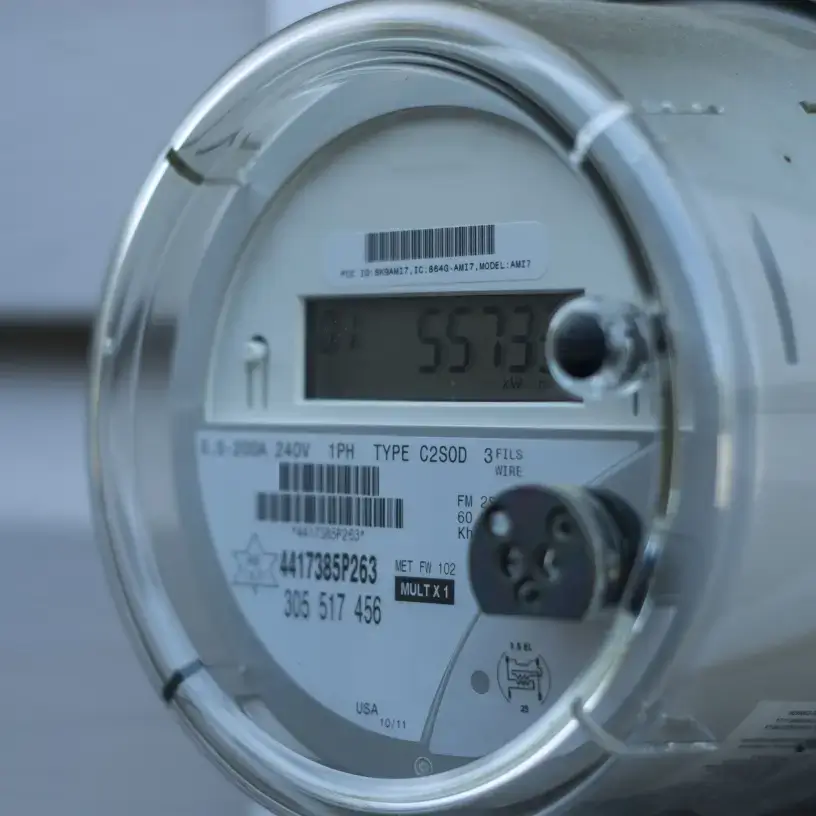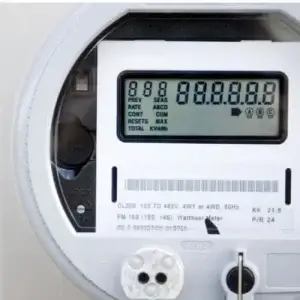Home / Compare Energy / What is a smart meter?

A guide to understanding smart meters
Updated 2 April, 2024

Key takeaways
- Smart meters can measure the energy in your home at 30-minute intervals, providing accurate and constant data on how you use energy in the home.
- You’ll need to have a smart meter if you want to access time-of-use tariffs or if you have solar panels.
- In most states, not every household is eligible for a smart meter and your electricity retailer isn’t required to update you with a new smart meter if there are no issues with your existing meter; however, smart meters are compulsory in Victoria.
What is a smart meter?
A smart meter is a power-monitoring device that replaces traditional electricity meters and provides you (and your energy retailer) with insight into your energy consumption.
Smart meters record and send energy usage information data in half-hourly blocks to your energy provider to measure the amount of electricity you use.
These digital meters (also known as type 4 meters or advanced interval meters) can do more than track your power usage. They can:
- Allow you to take advantage of solar power systems, solar feed-in tariffs and solar battery storage options
- Remotely turn electricity supply on or off
- Measure the power quality at your home
- Notify distributors (the companies responsible for maintaining infrastructure such as power lines and electricity poles) of power cuts
- Enable actual meter reads each billing cycle rather than an estimate, so you’re paying for your actual usage.
There are also other meters available that aren’t smart meters. For example, basic meters only record data every 3 months. Type 5 meters can still record half-hourly data but can’t do things that type 4 or advanced meters can do (such as send the data to the distributors) and a meter reader is required to download the data from the meter.
Expert tips for making the most out of your smart meter
If you have a smart meter, or are looking at getting one installed, you may be able to use it to access certain tariffs and better manage your energy so you can save on electricity bills. Our Head of Energy, Meredith O’Brien, has some tips on helping you get the most of your smart meter.

Track your energy usage
Sign up to your provider’s online account or app to view your smart meter data. By doing so, you’ll be able to see what times of the day and days of the week you’re using the most energy and make changes to ensure you aren’t wasting energy.
Take advantage of time-of-use tariffs
With a smart meter, you may be able to take advantage of flexible pricing with time-of-use tariffs. Check with your electricity retailer on whether you can shift this usage to off-peak times to save on costs or compare electricity retailers to search for one where you can. With this, you’ll also need to change your energy habits to ensure that you use most of your electricity during off peak or shoulder periods. Otherwise, this can be more expensive if you only use the bulk of electricity during peak periods.
Control your usage with smart devices
You can use your smart meter to connect to smart devices in your home. You may be able to remotely power our smart devices and time them, so they only operate when you need them to, helping you lower your energy use.
Understanding smart meters
How does a smart meter work?
 Smart meters record how much electricity you use and when, then sends this information to your electricity distributor. While smart meters are widely used in Victoria, many states still rely on three-monthly actual or estimated readings (where your energy usage is calculated based on previous usage patterns). In fact, only 30% of all homes outside of Victoria currently have a smart meter.1
Smart meters record how much electricity you use and when, then sends this information to your electricity distributor. While smart meters are widely used in Victoria, many states still rely on three-monthly actual or estimated readings (where your energy usage is calculated based on previous usage patterns). In fact, only 30% of all homes outside of Victoria currently have a smart meter.1
However, it works differently depending on your state or the type of meter you have.
According to the Victorian State Government, smart meters work through a four-step process:2
- In 30-minute intervals, your smart meter measures all electricity use in your home.
- Your smart meter sends this information to your energy provider or distributor, providing them with up-to-the-minute snapshots of your electricity usage.
- Your energy provider also gives you access to this data via in-home displays (if available), mobile phone apps or web portals linked to your smart meters.
- This information allows you to understand your energy usage patterns better, helps you work out ways you can reduce electricity usage and, consequently, save on your power bill.
However, type 4 meters operate slightly different and are more common in New South Wales and Queensland. While they still record half-hourly information about your energy usage, the fastest they currently send data to distributors is every 24 hours. Once this information is available, your provider will share it with you.
Am I eligible for a smart meter and how do I get one?
Your eligibility for a smart meter will depend on a series of factors, including if:
- Smart meters have been rolled out across your area
- You’re moving into a new build home
- Smart meters are required for your new electricity plan
- You’re installing a solar PV system
- An old meter needs to be replaced with a new meter if it’s damaged or at the end of its life.
Contact your energy provider to see whether you’re eligible to get a smart meter and what the next steps are. Your electricity provider will provide you with a smart meter if your current meter needs replacing or if you move to a plan that requires a smart meter.
How much does a smart meter cost?
The cost for smart meters varies between electricity providers. Some may waive upfront costs or smart meter installation fees but include other fees as part of your bill. Others may set their own servicing and maintenance fees. Always discuss these costs with your provider and compare your options.
How can smart meters save me money?
Smart meters give you more options for saving money; primarily, through electricity tariffs. If you’re on a time of use tariff, you could potentially save money by using your energy-heavy appliances during off-peak times and minimising your electricity usage during peak periods.
Adjusting your behaviour using data from your smart meter is one way to save – provided you have the corresponding tariff to support it.
With smart meters, you may have access to time-of-use tariffs as your provider will have the ability to monitor your usage throughout the day and charge accordingly.
If you’re eligible for a time-of-use tariff, you can take advantage of this by:
- Avoiding heavy usage in peak periods (e.g. Monday to Friday evenings) by not turning on heavy power appliances like clothes dryers, washing machines and dishwashers.
- Utilising lower off-peak prices (e.g. overnight on Saturday and Sunday) by using energy-heavy appliances at these times.
- Using shoulder periods whenever possible, measured between peak and off-peak periods, costs slightly less than peak, but higher than off-peak charges.
Benefits to using a smart meter
Reduce the need for manual meter readings
The core function of some smart meters is to transmit your household’s energy usage levels to your electricity provider. Of course, some smart readers may still require a manual read, so check your smart meter’s capability with your provider.
Communicate important updates to customers
It might surprise you to learn that your smart meter can also act as a simple communications device if you have an in-home display, registered for SMS alerts or have an online account or app to view your energy information. Energy providers can send public warnings about major power outages in your area and the estimated restoration time.
Identify outages and faults in the service
Thanks to your smart meter’s continuous two-way dialogue between your household and your energy provider, it can also help your distributor quickly identify any faults in the service or on the smart grid. This minimises downtime and helps streamline the reconnection process in the event of a blackout, ensuring your provider can get your power up and running again as quickly as possible.
Perform connections and disconnections when moving
Smart meters can remotely perform some key tasks on behalf of your energy provider, such as connecting and disconnecting your energy when moving. This makes moving to a new home quicker, easier and cheaper, as your meter is read daily.
Smart meters can also slash disconnection and reconnection fees, as companies don’t physically need to come to a property to turn power on or off. However, this can only occur if it’s safe, otherwise a meter reader will still need to physically attend the property. Distributors can still set their own fees for this service, which can vary between states.
Monitor your energy
You can monitor your energy usage in real-time with web portals, smart meter apps and in-home displays, which gives you more control over your usage. For example, they can help you figure out the best and worst times to use appliances with high-energy usage. You can also set up your system to receive warning messages for excessive energy usage.
What’s more, if you have solar power, you can use your smart meter to monitor how much of it you’re using and change your usage patterns to take advantage of your solar panels’ electricity generation.
Time your smart appliances
With smart meters, you can time when your appliances will start or turn them on remotely to manage energy usage if you have smart devices and a Wi-Fi connection.
Managing your smart meter
How do I read a smart meter?
While smart meters can track your electricity usage, they’re not something you can read manually. Instead, the meter service provider will receive information about your electricity consumption and then make this information available to you.3
You’ll usually be able to access this information online by logging into an account with your electricity provider. You typically have the option of viewing your hourly, daily, weekly and yearly usage, including any solar energy you’re generating if you have solar panels.
What does a smart meter look like?
Smart meters look similar to the older electricity meters you’re probably used to. While they’re similar in size, you’ll notice that most smart meters don’t have a dial and have a digital display. Of course, the exact appearance can vary between models and providers.
Meet our energy expert, Meredith O’Brien
As the Head of Energy at Compare the Market, Meredith O’Brien believes in educating Australian customers about the everchanging gas and electricity market so they can adjust their energy usage habits and get the most out of their energy plans.
Meredith has six years within the energy industry, following 15 years of experience in financial services and is currently studying a Master of Business Administration. Meredith is a dedicated customer advocate who is passionate about empowering Australians to find the right products to suit their needs by removing the confusion from comparing.
1 Australian Energy Market Commission (AEMC). Review of the regulatory framework for metering services. Published August 2023. Accessed October 2023.
2 Victorian State Government: Environment, Land, Water and Planning. Smart meters. Last updated September 2022. Accessed October 2023.
3 Australian Government: Australian Radiation Protection and Nuclear Safety Agency. Smart meters and health. Accessed October 2023.


